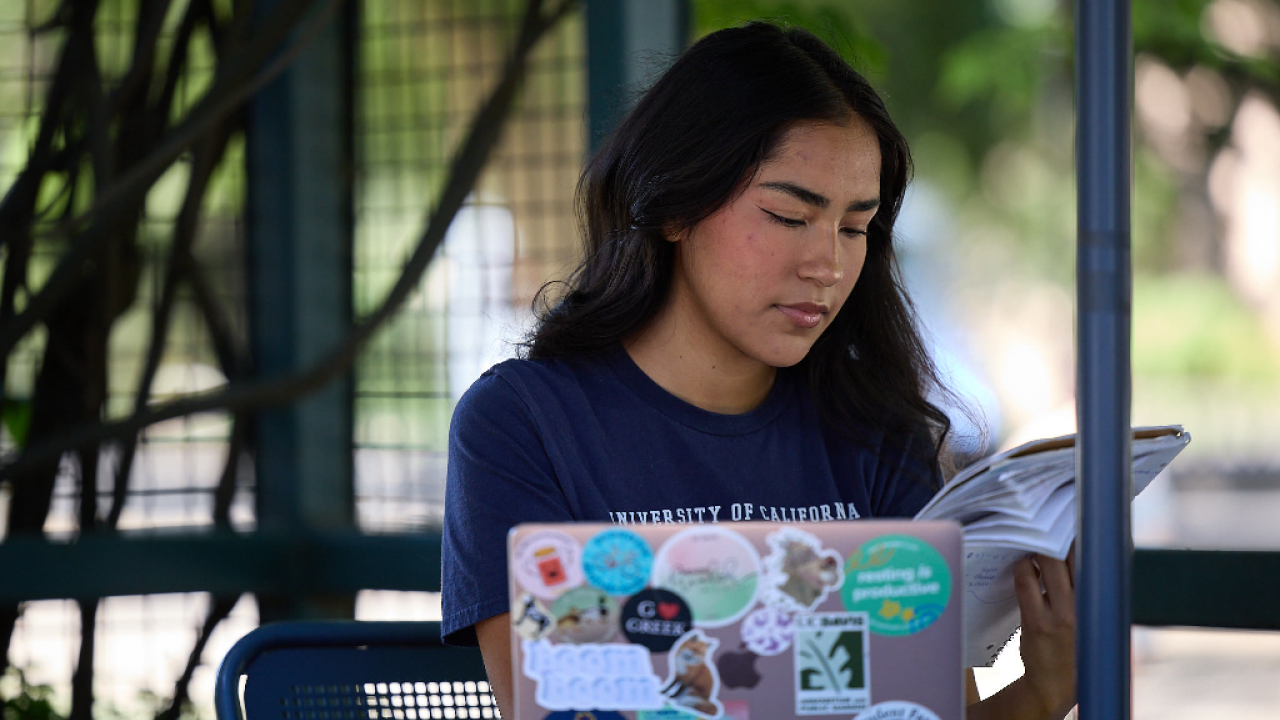UC Davis 2024 Summer Sessions opened June 24 with more flexibility for students than ever — including a record 44 online courses. Four virtual General Education courses in psychology and communication also debuted.
Until 2020 and 2021, when all courses were provided online, UC Davis Summer Sessions courses typically included about a dozen virtual courses out of its 600-plus courses. This year, about 7% of the over-700 course offerings are available in a virtual format. The expanded offerings already show promise, with a fill rate of 92% for virtual courses versus a 69% fill rate for in-person courses.
The four new virtual courses — General Psychology, Developmental Psychology, Interpersonal Communication, and Child Adolescent and Media — are the result of a pilot project initiated by Matt Traxler, associate vice provost for Undergraduate Education, and led by Omega Lee, Summer Sessions executive director.
MORE ABOUT SUMMER
“Chiefly, we did this to provide undergraduates with greater and more equitable access to coursework in the summer. Students, especially lower-income students, face major challenges to participating in Summer Sessions,” Traxler said. “Students expressed much greater interest in virtual coursework in the post-pandemic period. Providing more high-quality remote learning opportunities helps us reach more students who couldn’t previously reconcile competing needs to be home, work and perform family responsibilities along with their desire to further their educations.”
Traxler said faculty also expressed interest in remote teaching.
“Like students, faculty face challenges balancing their desire to teach with other responsibilities,” he said. “Virtual courses create additional opportunities for faculty to teach in the same way they create additional opportunities for students to take courses.”
Additionally, robust enrollment in Summer Sessions helps ease pressure on fall, winter and spring quarter operations.
“When more students participate in Summer Sessions, that opens up seats in courses in fall, winter and spring, bringing student demand and course availability into greater balance,” he said.
Faculty lead efforts to develop virtual courses
Summer Sessions recruited eight faculty members last fall to develop new virtual courses for the Academic Senate Committee on Courses of Instruction to review as additions. The faculty worked in consultation with department chairs and courses. The authority to add courses, Traxel said, resides with those units and the Academic Senate.
“To the extent that virtual courses align with teaching priorities, Summer Sessions provides practical support to make those courses possible for students,” Traxel said.
This means greater flexibility for students.
“These are courses that can be difficult to enroll in,” Lee said. “They may also have smaller class sizes in the summer, reducing waitlists and providing students a better chance at securing a spot.”
As Summer Sessions leaders assess the value and success of the four courses, 25 additional courses are in development for future Summer Sessions. Next steps, Traxler said, include continuing support for faculty as they move the proposed new courses from the approval process through the course development and delivery processes.
He credited UC Davis Continuing and Professional Education, or CPE, for partnering with faculty and providing pedagogical and technical expertise in virtual course development and delivery.
CPE serves non-traditional learners, particularly working professionals, as they refresh and expand job skills over the course of their careers. It has offered online programming for nearly 25 years and is leading campus efforts to develop self-supporting, online master’s degrees in collaboration with UC Davis schools and colleges.
“CPE has a long history of developing and delivering high-quality remote courses. Thus, they are ideally suited to supporting our faculty,” Traxler said. “It is gratifying for me to see the individual attention that CPE devoted to our instructors as they work through the process of building new syllabi for remote courses, new instructional materials and new ways of assessing student work remotely.”
Julie Greenwood, dean of UC Davis Continuing and Professional Education, said the online courses give students more choices.
“For many students, in-person Summer Sessions just aren’t an option,” Greenwood said. “Online changes that. Our partnership with the Office of Undergraduate Education helps ensure that all students have the access and opportunity to set themselves up for success at UC Davis.”
Balancing flexibility with quality
Still, the increased flexibility doesn’t solve all the problems some students face.
“We still have to worry about access to technology, access to high-speed internet, suitability of home-learning environments and more,” Traxler said. “We continue to worry about the technical aspects of virtual courses and seek solutions. We will continue to consult with our campus experts and the instructors to track issues as they arise and develop means to overcome those challenges.”
As faculty continue work on other new courses, the Summer Sessions team will assess instructor experience and student outcomes to apply lessons learned and identify future courses to add to the virtual portfolio.
“We love our faculty partners,” Traxler said. “It has been highly gratifying to see their rigorous approach to developing new virtual courses. UC Davis instructors are the best.”
Media Resources
Jenny Carrick is marketing and communications director for Enrollment Management, and can be reached by email or at 530-752-5139.
